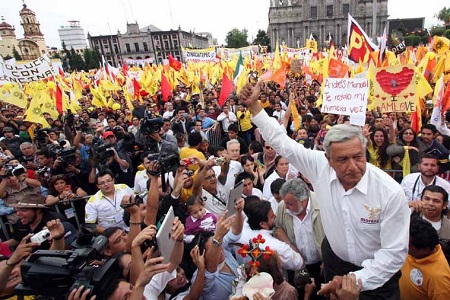It’s been a bad century or so for you if you’re a Mexican leftist.![]()
Barring a huge upset, Sunday’s presidential and parliamentary elections are not going to change that.
Despite coming within a very narrow margin of winning Mexico’s presidency in 2006, the candidate of the leftist Partido de la Revolución Democrática (PRD), Andrés Manuel López Obrador seems likely to do much more poorly this time around — despite a poll boost that’s seen him overtake Josefina Vázquez Mota, the candidate of the Partido Acción Nacional (PAN) earlier this month, and despite an anti-PRI youth movement, #YoSoy132, that has rallied opposition to the PRI (although not necessarily in favor of the PRD).
López Obrador — or “AMLO” as he’s known in the media and among his supporters — is holding a large rally in central Mexico City today to wrap up his presidential campaign, starting on the Reforma, Mexico’s grand avenue, and marching all the way to the Zócalo, the central square of Mexico City.
And while he may well come within single digits of the frontrunner, Enrique Peña Nieto, candidate of the Partido Revolucionario Institucional (PRI), it seems almost assured that 2012 — like 2006 and so many elections before it — will not be the year for Mexico’s left.
López Obrador, who has, fairly or unfairly, been tagged as a bit of a messianic figure in Mexican politics, refused to cede the PRD’s presidential nomination to his successor as Mexico City’s mayor, Marcelo Ebrard. Ebrard, who lacks López Obrador’s baggage and who is viewed as much more centrist, could well have given Peña Nieto a strong run. Given the recent success in several 2010 gubernatorial races of PAN-PRD coalitions, it is possible that Ebrard could have challenged Peña Nieto in a two person-race on such a PAN-PRD banner nationally. Continue reading From Cárdenas to López Obrador: Why the Mexican left just can’t win


